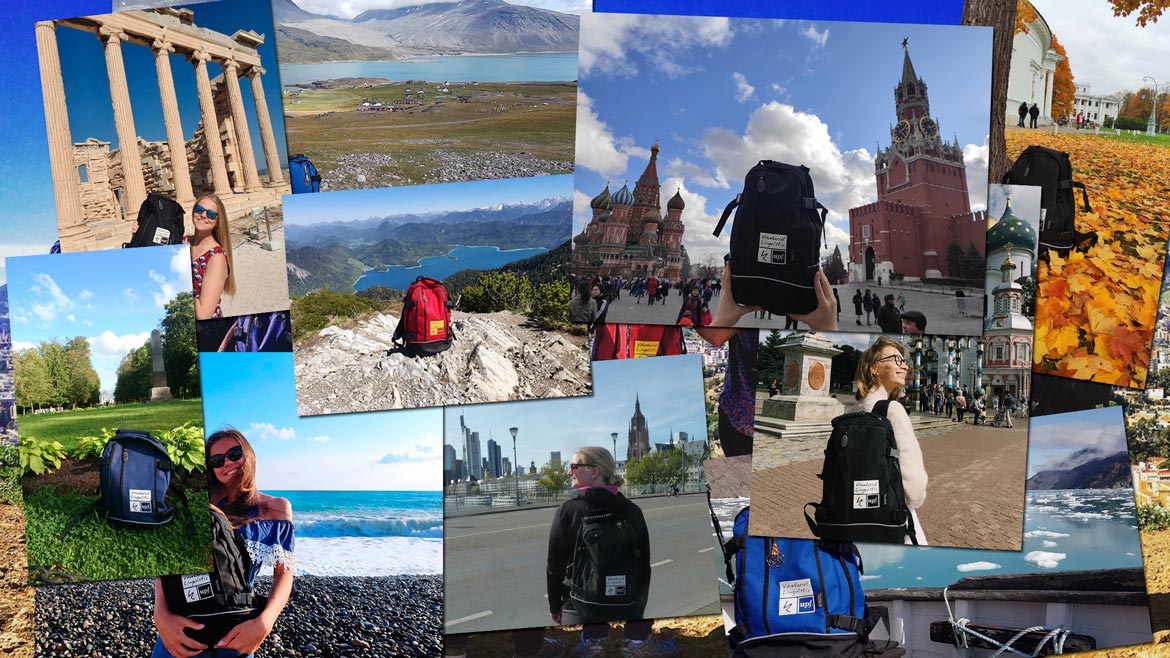A Fons
7. In depth
20 years of the Language Volunteering programme: an international community united through the UPF experience
In 2000, Language Volunteering was launched, a cultural programme promoted and managed by UPF to receive international students and show them the variety and wealth of the culture, language, nation, geography and gastronomy of Catalonia. Since then, more than 14,000 students from all around the world have been involved and have forged a bond with UPF, Barcelona and Catalonia that continues after they have returned to their countries of origin.
“Before the Erasmus, I had heard of Catalonia and that Catalans speak their own language, but that was all I knew. Six months later, could explain lots about it”, says Polina Nenasheva. In January 2019, she came from St. Petersburg (Russia) to Pompeu Fabra University on an exchange to study Business Administration-Management. “It was the first place I considered and for some reason it immediately stole my heart and I decided not to apply to any other. At that time, I didn’t know it, but fate brought me to the right place”, she explains.
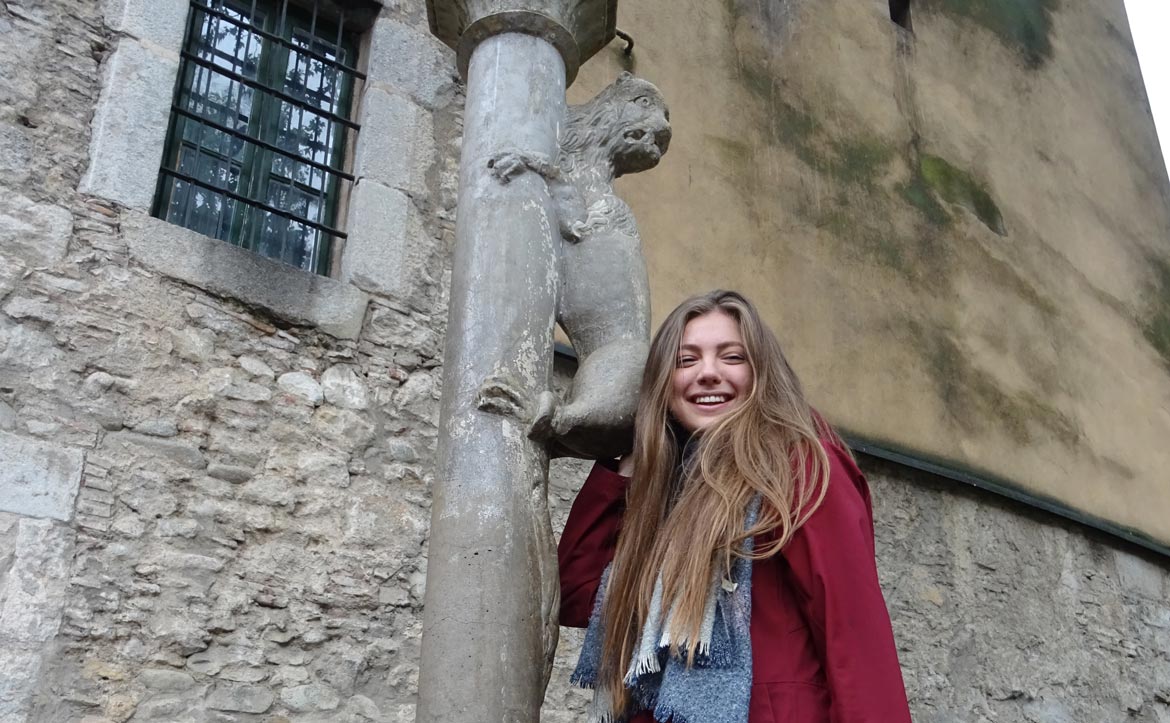
Once in Barcelona, she attended the welcome session held by the University for international students. There, they spoke to her “with such enthusiasm about the Language Volunteering programme, about students who belong to a big family, my heart was won over. I felt that they were friendly people who wanted to learn interesting, new things together, share their emotions and impressions and enjoy their time in Barcelona and in Catalonia, and I signed up without hesitation”, she recalls.
Since UPF came into existence now thirty years ago, the number of international students who come on an exchange has increased exponentially year after year. During the 2019-2020 academic year, some 1,900 students from all around the world chose UPF. Although the city and Catalonia are quite well known today throughout the world, in the mid-1990s, when the Erasmus phenomenon began to become more commonplace, things were rather different. “We found ourselves with a language problem: there was an increasing number of international students who would raise their hand and ask for the lecture to be given in Spanish because they did not understand Catalan”, explains Albert Servitje, coordinator of the Language Services and head of the Language Volunteering programme. “Probably, the majority had not been properly informed, no one took care of them and they were annoyed”, he continues.
Then they realized something had to be done and that it was not enough just to attract lots of international students but, once they were here, they had to be supported and helped. Hence, it was decided to devise a plan with three pillars: to inform them about the University and what they could expect of it, before coming; to provide them with free courses to train them once they are here; and to liven up what they were learning. This third goal gave rise to Language Volunteering, an institutional cultural programme that aims to show students from other countries the variety and wealth of the culture, language, nation, geography and gastronomy of Catalonia through cultural activities and excursions. Unlike other programmes, it is UPF itself that promotes, manages and offers its students the opportunity to train through university extension activities.
In the 20 years of the Language Volunteering programme there have been more than 600 outings, an average of thirty each academic year involving around 14,000 students from all across the world.
The agreement by the Governing Board of 17 May 2000 gave the green light and it was launched in the 2001-2002 academic year. Since then, there have been more than 600 outings, an average of thirty each academic year involving around 14,000 students from all across the world. 2010 saw a qualitative leap and the number and types of outings increased, and this year, 2020, the Language Volunteering programme is celebrating its twentieth anniversary of welcoming international students and helping them to form a bond with Barcelona, Catalonia and UPF.
Five experiences in the first person
Learning to live like a “short-term local”
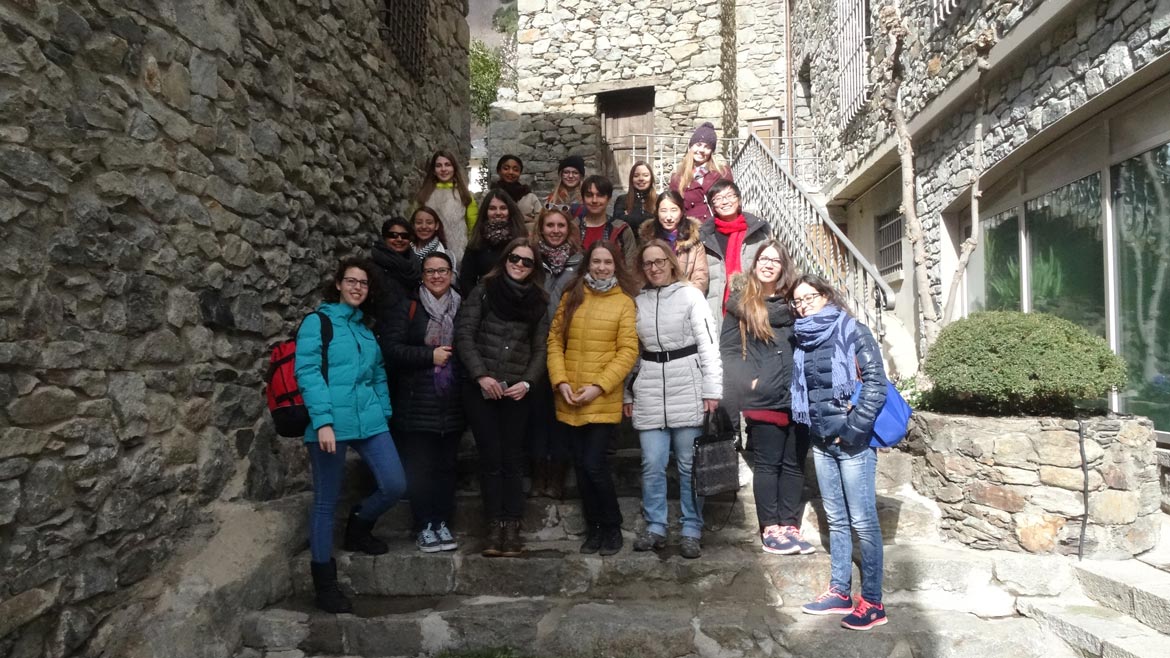
“I had been to Barcelona several times, but living there is very different to going there on holiday”, explains Mizan Rambhoros, who came from South Africa in July 2015 to begin her doctorate with the Department of Humanities at UPF. “I was determined to immerse myself in the day-to-day life of Barcelona, to discover its social and spatial culture and the Language Volunteering programme was the perfect opportunity for me”, she says. From the outset, the programme tries to make students feel part of Catalan society. “I always say that they are short-term locals, and they really like being called like that because we are saying that now they are one of us. A tourist will leave and be left with a superficial knowledge, but not them”, Servitje explains.
He is the programme liaison officer, undertaking to accompany the students and organize trips, from travel arrangements to the activities in which they will participate. Some time ago, he decided to create a timeline to allow participants to follow and understand the history of Catalonia from the beginning to the present day and visit the most emblematic sites. “As locals, they must have been to Montserrat, learned to make pa amb tomàquet (tomato bread), drunk from a porró, visited Girona...”, he says.
The starting point is Empúries, where they discover what was there before Catalonia existed, which peoples lived there, and its Romanization, among others. “It helped me to understand Catalonia’s position and history within Spain. It gave me the opportunity to see the physical remains of what I was studying in class, and that helped me to better understand the history and culture”, explains Lillian Wangler, a North American student who was at UPF from April to June 2016, studying the history of the western Mediterranean.
The following outing is to Ripoll, known as the cradle of Catalonia, where they discover the legend of Wilfred the Hairy, and that same afternoon, they visit Santa Margarida volcano in Olot. They also pay a visit to Banyoles, Besalú, Girona and Tarragona, among others, and they even spend a weekend skiing in Andorra. “Until I found out about the programme, all I did at weekends was sit and read articles from the master’s degree. Signing up for the excursions allowed me to see another parts of Catalonia and it really helped me to study, to be more motivated”, explains Ai Muto, who came to UPF from Japan during the 2018-2019 academic year to study the master’s degree in Theoretical and Applied Linguistics.
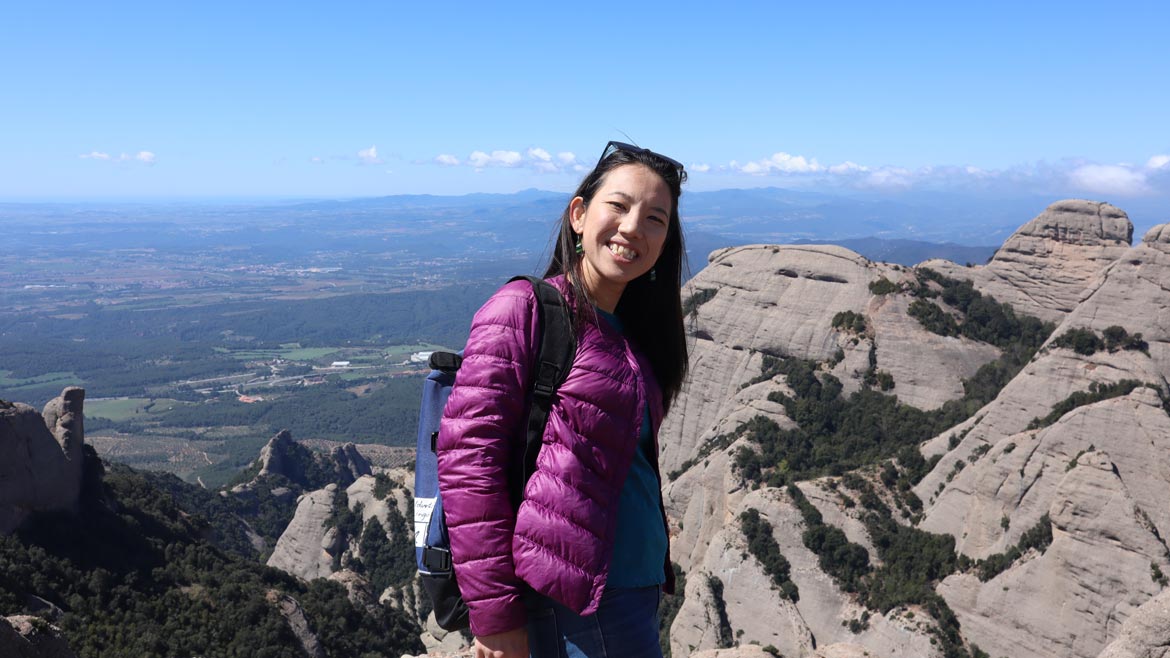
Thanks to the Language Volunteering programme, lots of students leave the confines of Barcelona and discover places that would otherwise have gone unnoticed. Undergraduate students especially, because of their age, are more hesitant to do so on their own. “When I arrived, I knew I wanted to discover various places, sights, cuisine... However, I wouldn’t have visited so many beautiful, interesting and out-of-the-way places of Catalonia on my own. I would probably have heard about major festivities and international events, but wouldn’t have been able to take part like the locals do”, says Polina Nenasheva. In the case of Carlos Andrés Barbosa, who came from Colombia in 2014 to do his PhD in Humanities, it was the main channel to find out all about Catalonia and “it encouraged me to go on some trips on my own”.
Every Saturday of each term, ten it all, an outing is organized alternating between visits to outside and visits inside the city. Students discover places like the Modernist Eixample, the Palau de la Música, Montjuic and Tibidabo. “All the activities are different and each has its own special atmosphere. Some itineraries are filled with the history and culture of Catalonia; on others, we became more familiar with its traditions; and on some, we mainly talked among ourselves and shared our cultural traits and interesting stories”, Polina explains. Sometimes trips are also organized during the week so that students can visit institutions such as TV3 or the National Library of Catalonia.
In addition to revealing the history to them, Language Volunteering also gives them the chance to learn about Catalan traditions and cuisine.
But, in addition to revealing its history to them, the Language Volunteering programme also gives them the chance to learn about Catalan traditions and cuisine. In October, they celebrate the castanyada eating marzipan panallets and chestnuts and drinking muscatel wine. “They say: I saw a poster in the neighbourhood announcing the castanyada and I didn’t know what it was”, Servitje explains. They go on an excursion to the Penedès region where they visit a wine cellar: they stroll through the vineyards and learn to drink from a porró. On another occasion, they had a pa amb tomàquet (tomato bread) workshop. And for the last outing during the first term, they visit Girona, where they sample xuixo pastries. “They really associate what they sample with a place”, says Servitje. “I was able to experience Catalonia with all my senses: hearing the language, smelling and tasting authentic food and drink, seeing works of art, touching the buildings of both local people and of the masters... I discovered the spirit of the place and of the people”, Mizan Rambhoros appraises.
Music also plays a major role in the global cultural context that the Language Volunteering programme seeks to convey to them. “Some years ago, a student asked me if there was music in Catalan, they don’t know, and a nation is nothing without music”, Servitje explains. So, every Tuesday they receive an email with information about the upcoming excursion which includes several songs, both current and more classic, often associated with the places to be visited. “We give them information about the place, why we are going there, why it’s important, links of interest... So, those who can’t come can also learn”, Servitje clarifies.
The experience also reaches their families. “Many tell me that when they come to visit them, they take them to see the places they have discovered and explain their history. This makes them feel that they are not here just breathing and studying but, really, those who get involved are living here, they belong to the society and they are proud to be able to act as guides for family and friends”, Servitje says.
A place to create a network of friends
The Language Volunteering programme is a success story. Most students value the programme highly and feel it adds value to their stay. “The feedback is very positive and the programme provides extra affection towards and bonds with the University. Many people are really fond of it”, Servitje affirms.
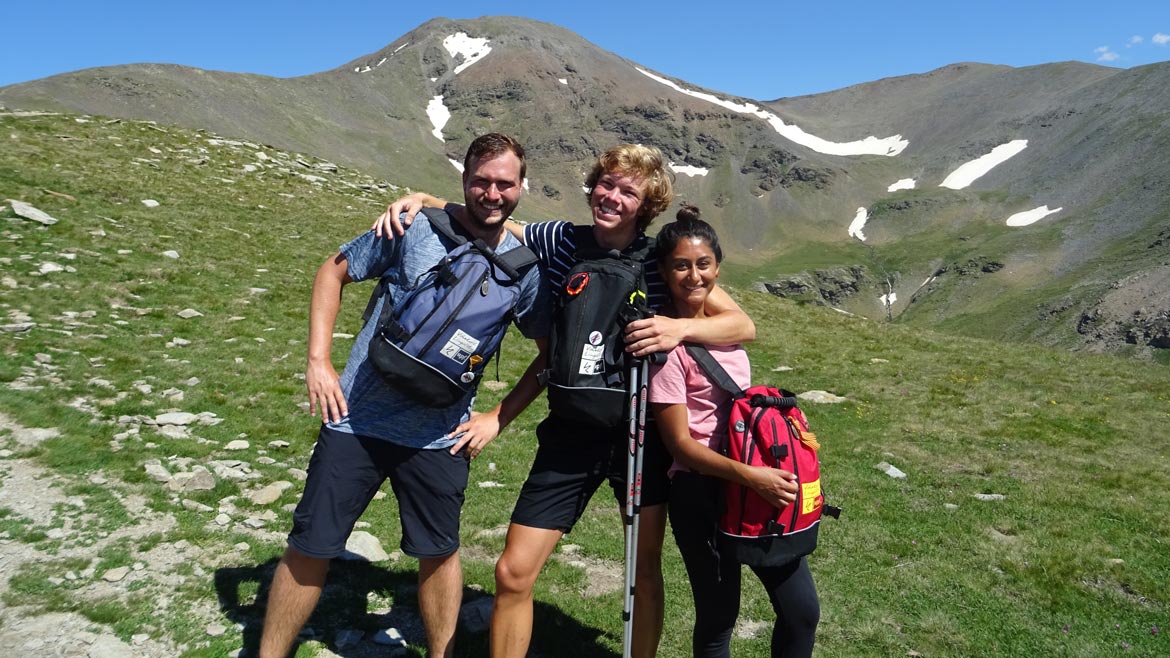
For Lukas Jungwirth, who came from Munich (Germany) to do the university master’s degree in Current Democracies: Nationalism, Federalism and Multiculturalism, “right from the outset, the Language Volunteering programme gives you the feeling of belonging to something really special. It’s like a family you can’t be without and you enjoy every second of the trips. You can’t wait for the following Saturday”. In addition to everything they learn about Catalonia, the majority believes that the Language Volunteering programme is the space where they can socialize and meet people from around the world. For Carlos, the programme was a social meeting point and a way for him to feel at home. “Leaving your home country is a challenge at first, you don’t know anyone, you have to adapt to the host culture... The Language Volunteering programme made a huge difference to making friends and learning better about the place to which I had come in the world”, he says.
“Many people, when they finish their classes. are waiting for the following day to see people. The outings make a huge difference because they are interested in the activity and, in turn, they can be with other people. It helps create a network of friends, which is necessary to feel good and at home in a place”, Servitje says. “For me, the Language Volunteering programme is particularly valuable for its diversity. It brings such different people from all around the world together in a big family”, Polina Nenasheva explains.
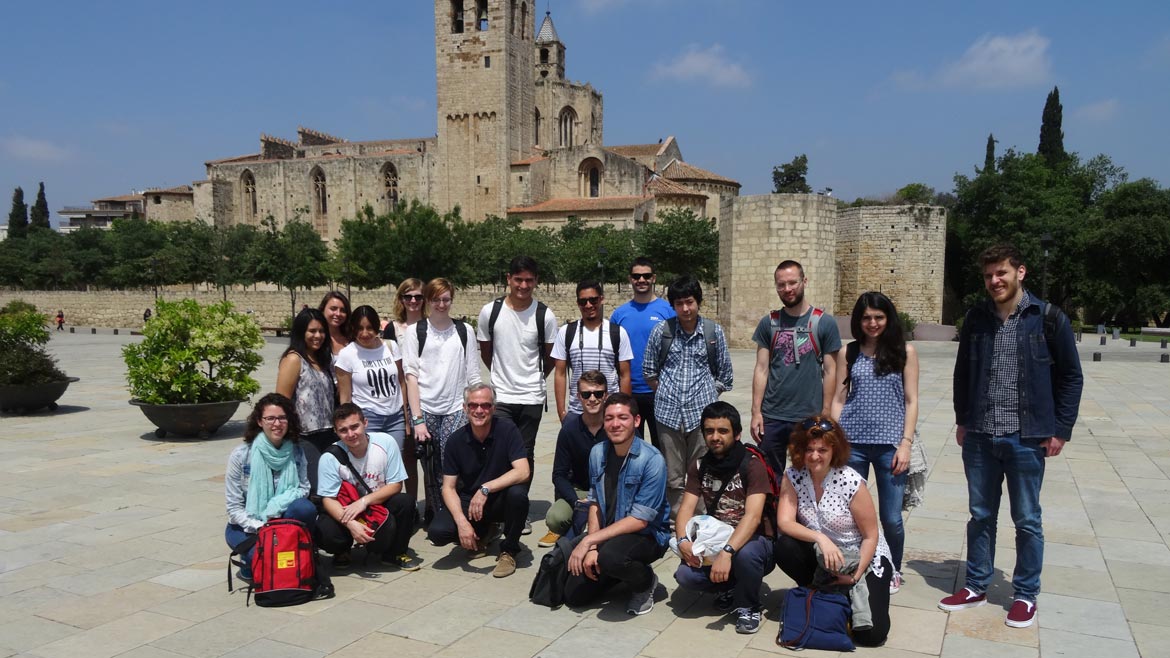
One of the particularities of the programme is that students discover new experiences with people who are also living them for the first time. “I have Catalan friends that have shown me Catalonia, but the Language Volunteering experience is superior to any explanation and it’s great. It is the whole experience at the same time. UPF takes care of everything and we were given all the information and all the participants learned together”, says the North American, Lillian Wagner.
The experience even influenced Mizan’s doctoral thesis, because the relationships she forged with the students and her experience of the programme shaped her inner geography and tied her to far more than a place.
The experience even influenced Mizan’s doctoral thesis, because the relationships she forged with the students and her experience of the programme shaped her inner geography and tied her to far more than a place. “Interestingly, inner geographies are especially important for the members of the Language Volunteering programme. Barcelona is at the same time a point of transfer, interconnection, connection and a centre point and is interlinked with our trips, and also with the perceptions we have of it and affection towards it or we have when we live in the city and when we pass through”, she explains.
Internationalizing Catalan students without leaving Catalonia
The other branch of the Language Volunteering programme are the language tandems, where the enormous wealth of having so many students from around the world at UPF can be taken advantage of. They consist, on the one hand, of a Catalan student, PAS or PDI, and on the other, different mother tongues that meet for language and cultural exchange. So far, over 7,000 have been formed. “I was really attracted to this opportunity to practise languages with a native speaker in my own city”, says Anna Marmol, a student on the bachelor’s degree in Applied Languages. Her tandem partner was from the United States and they met up at least once a week for a term. “Not only did I learn new vocabulary, but she talked about life in her country, teaching me about aspects of her everyday life. I managed to learn about the culture without going there”, she explains. I took her to visit different areas of the city and cafés and restaurants I like.
“I was really attracted to this opportunity to practise languages with a native speaker in my own city”
In the case of Núria Capdevila, a student on the bachelor’s degree in Translation and Interpreting, her main objective was to “meet someone with a completely different culture, customs and ways of thinking from mine”. And she achieved this through a language tandem from China. “I value the experience most positively, and personally I would definitely repeat it”, and she adds that she is still in contact even after completing the exchange.
Language Volunteering programme data for the 2019-2020 academic year
Language Volunteering data for the 2019-2020 academic year
- 312
language tandems
- 345
applications by international students
- 365
applications by Catalan students
Last academic year, over 300 language tandems were formed involving languages as diverse as Norwegian and Chinese. To date, 17 different majority and minority languages have been exchanged. Oriol Espinosa, a student on the bachelor’s degree in Humanities, was studying English, Norwegian and French. “The University offered the chance to talk to natives and I found it a very good idea because I could also help them to learn more about the culture and the country”, he explains. Also, Irene Vilchez, from the double bachelor’s degree in Translation and Interpreting and Applied Languages recognizes that the programme helped her learn about new cultures. She did a tandem with a girl from Bucharest, and they exchanged Romanian and Spanish. “I especially remember one day that we were talking about the customs in Romania, Spain and Catalonia at Christmas, and she couldn’t believe her ears when I explained what the tió is all about”, she says.
“The University offered the chance to talk to natives and I found it a very good idea because I could also help them to learn more about the culture and the country”
Between 10 and 15% of the international students who request a language tandem want to learn Catalan. And the Language Volunteering programme encourages them to do so. “Our goal is not for them to learn it inside-out, but learning a few words enriches their experience as it allows them to better understand and interact with the locals”, Servitje acknowledges. Most return home knowing how to say something. “I still don’t speak Catalan well, but I’m glad that at least I can understand a little, answer a few standard phrases and shout bon dia joyfully to everyone”, Polina states. In the case of Carlos, he already spoke some before but the experience helped him improve. “Now, in Bogotá, I am still in contact with the Catalan culture through the Catalan Community of Colombia”, he explains.
A sense of belonging that ties them to UPF and the Catalan culture
Six years ago, the Language Volunteering programme launched its Facebook account. So far, they have over 2,000 followers, who often interact with publications and photographs. To mark the twentieth anniversary of the programme, some fifty international students from different years, from 2014 to the present, from 30 different countries, have created a photo album on the social network congratulating the programme and wishing it a long life to come. “Twenty years is a special milestone and it has made many people feel that the programme is still alive and well”, Servitje opines.
This is but a small gesture that shows that, having left for their countries, many students who took part in the programme want to keep connected to it. Another is the backpack. “The Language Volunteering programme gives them a backpack and they send photos of them travelling around the world with it. It gives a sense of being an international community, united through the Language Volunteering programme but scattered throughout the world”, Servitje says.
Some students have sometimes returned to Barcelona and have joined us on an excursion. This is the case of Polina, who last year accompanied them on the trip to Andorra. “I realized that the people from the Language Volunteering programme are always changing, but what unites them remains unaltered and it is a home where you are always welcome, no matter how long it’s been”, she explains.
“I realized that the people from the Language Volunteering programme are always changing, but what unites them remains unaltered and it is a home where you are always welcome, no matter how long it’s been”
The Language Volunteering programme will always tie them to UPF and Catalan culture because once they leave, the place where they lived, the lecturers and a great many peers they had met, are left behind, the city will change, but what they have lived through the programme lasts forever. “Although we are now far away, we are fortunate that friendship knows no distance. We remain in contact from our home countries, keeping up to date, encouraging us, motivating us and remembering the good times we shared with Barcelona on the Language Volunteering programme. Catalonia will always be the place we “return to”, regardless of where we are”, says Mizan.






